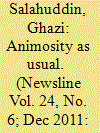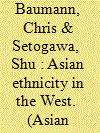| Srl | Item |
| 1 |
ID:
109380


|
|
|
| 2 |
ID:
139459


|
|
|
|
|
| Summary/Abstract |
The emergence of ethnic markets has been rapid following the growing trend of intra-national diversity in developed nations. These new markets have attracted researchers to investigate the role of ethnicity in consumer behaviour; however, to date, literature has focused on the role of the origin of tangible goods/products. In contrast, ethnic marketing for services has gained little attention. This study fills this gap by investigating the effect of ethnicity of service staff on consumers’ preferences for services. These effects are tested for the four service types identified in Lovelock’s service classification scheme. This study examined consumers’ preferences in services based on the ethnicity/racial category of service staff (Caucasian, Chinese, Indian and Korean) and service type (Medical, Education, Financial and Cleaning). A shopping mall intercept survey included a sample of 471. Multivariate analysis of variance was applied to test for significant variances between the mean preferences. Significant differences in preferences for the ethnicity of service staff were empirically established. Consumers, regardless of their ethnicity, prefer service staff of the same ethnicity. This creates a gap between preferences for one’s own ethnicity and preferences for others. This tendency was especially strong in medical services. Consumers’ preferences for service staff ethnicity are explained by the theories of country of origin, animosity, homophily and language. This study encourages service providers to make use of ethnic marketing, since a better match between service staff and customers’ preferences results in less miscommunication and better cultural understanding. Training on cultural sensitivity is also encouraged. This study establishes the important role of the country of origin in services. We name this the ‘country of origin of service staff (COSS)’ effect.
|
|
|
|
|
|
|
|
|
|
|
|
|
|
|
|
| 3 |
ID:
174435


|
|
|
|
|
| Summary/Abstract |
This article analyzes regional events in the twenty-first century and identifies Turkey's relations with Arab countries, pointing out the serious deterioration that has occurred in those relations with its bordering Arab neighbors as well as Egypt and Lebanon. The article argues that Turkey's “imperatives of state,” as in the case of any other state actor, determine the foreign policy trajectory and consequently its regional and international relations. Turkey has chosen to ally itself with pro-Western regional states, namely Israel and Qatar, but not others, such as Egypt. Creating rivalry and animosity with bordering states is neither conducive to Turkey's long-term relations with those states nor to its ultimate political stability. Its NATO membership exacerbates animosity that would ultimately work against Turkey's regional influence. Consequently, Turkey's imperatives of state ironically stand in the way of achieving its regional ambitions.
|
|
|
|
|
|
|
|
|
|
|
|
|
|
|
|